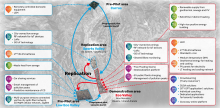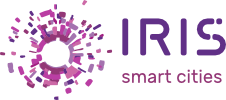
Métropole Nice Côte d’Azur, with approximately 540,000 inhabitants, is one of the frontrunners of Europe in terms of smart strategies and urban digital transformation. We caught up with Jean-Charles Maleysson to talk about their role as a lighthouse city for the IRIS Smart Cities project.
Although the Metropole’s economy has long depended on tourism, Nice is now undergoing a digital transformation. In 2015 it was ranked as one of the top five smart cities in the world, alongside megacities like London, New York and Singapore, punching well above its weight in terms of population size.
‘It’s all about diversifying the attractiveness of the territory,’ said Jean-Charles Maleysson of the Métropole Nice Côte d’Azur. The territory’s key challenge is the availability of energy, so the smartification of Nice will focus mainly on energy efficiency and smart grids. ‘To turn smart is a good way to control the supply of energy for the whole territory,’ said Maleysson.
The Métropole has several designated districts under which the digital transformation is managed – Nice Méridia, Grand Arenas, Eco-quartier St Isidore, Nice Valley, Plaine des Sports to name just a few. The IRIS project, whose goal is to improve urban life through more sustainable integrated solutions, has pegged Nice as a ‘lighthouse’ city, acting as an example to four ‘follower’ cities across Europe.
The IRIS project focuses on two of the Nice eco-districts, namely Nice Méridia and the Grand Arenas. Nice Méridia is one of the more developed sites, with 69 sustainable housing units already constructed out of an anticipated 2,100.
Triple helix
The coordination of such initiatives is not straightforward, of course.
‘The Nice ecosystem is made up of nine partners, so we have a triple helix cooperation,’ said Maleysson. The triple helix refers to the combination of local authorities, academic partners and industry to engage all stakeholders in the development of the city.
‘Our aim is to experiment and facilitate the testing of innovative tools and services,’ said Maleysson.
The Métropole also gleans knowledge from dedicated sectors within the local government system called directorates. ‘Basically we involve directorates that have expertise in different technical aspects into our organisation. We have the mobility directorate, the energy directorate, the informatic system directorate, and our goal here is to give global perspectives of these activities,’ said Maleysson.
The combination of local government know-how with academic expertise and industry partnerships bring a collaborative approach to the project management. The Métropole of Nice Côte d’Azur has also heavily relied on the input of citizens, an important step which leads to a great improvement in services uptake. ‘If you lack communication and if you don’t involve the citizens from the very first step then it might be difficult for the citizen to adopt the service. Many start-ups can set up a super hub but they forget the communication. Even if you have a super application with services and good design, if nobody knows it exists, nobody will use it.’
The Métropole of Nice Côte d’Azur has been engaging with citizens ever since the initial planning stage of the project. The local authorities also develop user case studies using design thinking to try to anticipate how citizens will react to a new idea or innovation.
‘We try to identify a roadmap of what the user experience will be and what we need to do to ensure that the parameter and the technical components are designed in such a way that we can later receive the information and the data about the services,’ said Maleysson. Information gleaned in this way is fed into the CIP, or City Innovation Platform. This platform, a key aspect of the IRIS project, will collect and sort all the mobility, energy and environmental data produced from the various districts, and will coordinate with the CIPs from the other IRIS lighthouse cities, Utrecht and Gothenburg. Nice is heavily involved in the CIP, as it is the city’s responsibility to coordinate the IRIS work package dedicated to the development of the platform.
The overall objective of IRIS project is to make the city smarter and to improve citizen’s daily life experience.
‘It’s important to increase the quality of service to the citizens. It is also an opportunity to improve our internal processes and the effectiveness of the public services. The digital transformation of the territory has an impact on many aspects but basically the advantages are a diversified economy, better control of the energy supply and the facilitation of the digital transformation of the whole Métropole itself,’ he said.
16 Oct 2018

